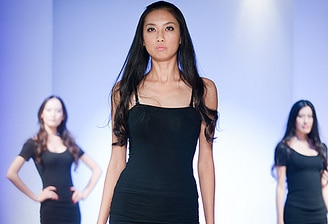How is female beauty defined in China? Regardless of where I go, everyone seems to have the same opinion: skin white as snow, hair straight long and black, body thin like a willow, and personality as gentle as a dove. Basically, a Chinese Snow White.
As anyone who has spent some time living in China knows, people here have no societal qualms about openly criticizing the physical appearance of others. Regardless of where I go in China, everyone without fail, and usually with “well-meaning” intentions, give me advice on how to become the ideal Chinese woman.
“You should lose about 20 pounds,” my trainer at the gym said bluntly, “try running on the elliptical for about 2 hours each day.”
“You should keep out of the sun, wear long sleeves! Look how dark your face is,” cried one of the other ladies in my Hash group (a running meet-up group), after we just finished a two-hour run.
“No no, 菲菲 (Fei Fei) isn’t going to eat any more, she’s trying to 减肥 (jian fei) [lose weight],” my aunt would joke as I refused my uncle’s attempts to serve me more food.
Just for the record, I am not fat. Most people, even Chinese people, don’t describe me as 肥胖 (fei pang) or “obese,” but neither am I small. Being a girl of solid northern Chinese peasant stock, I have a relatively athletic build. You know, the kind of body structure that lends itself well to agricultural toil. For lack of a better term, my grandmother describes me as “结实” (jie shi), “sturdy.”
Ouch… that’s like being called “big-boned.”
Unlike some foreigners, I can’t always turn a deaf ear to “fat” comments and pretend Chinese standards don’t apply to me. Instead, somewhere inside I have a fear that maybe something is wrong with me. If I am Chinese ethnically, why can’t I look like Chinese girls “should”? On the outside I pretended not to care, inside I was tortured by nagging doubt. I found myself obsessing over food, emotionally punishing myself every time I don’t make it to the gym; wondering whether I should wear long sleeves, hats … gloves. I even thought about using skin whitening creams.
Then, one day, I realized that it wasn’t me. I was not the only girl in China that didn’t look like a proper “Chinese” girl. The truth of the matter is, Chinese women do NOT all look alike. The “Chinese” are a result of 5,000 years of ethnic inter-mixing, bringing together a hugely disparate collection of peoples from across the Asian continent. Chinese women come in all shapes and sizes and colors: dark-skinned, fair-skinned, broad shouldered, and short legged. Then there are those who are six-feet tall and those barely brushing five feet. Some have large eyes, some small eyes. Some wear their hair as straight as chopsticks, others wear curls. Some carry large tummies but small butts, some have big butts but thin arms, some have no chest and some are well endowed all around.
In America, the practice of “fat shaming”, or any bullying due to physical appearance, is increasingly viewed as unacceptable. Already, women’s magazines, popular culture, and media are moving away from the “thin-is-in” standard and instead, raise-up diverse women of healthy physicality as examples of female beauty. In America, where I am considered physically average, I am emboldened by these examples to better myself, not criticize myself. I embrace the sunlight, I eat foods because they are nutritious, not because they are low fat, and I stand tall, with no fear that my height will make me seem “unfeminine.”
I only hope that one day, women in China can experience the same sort of societal revolution in the way they view female beauty. Instead of 白富美 (baifumei), “white rich and beautiful,” Chinese women can look forward to being 百种美 (baizhongmei), “hundreds of different kinds of beauty.” Chinese women don’t all look alike, and society shouldn’t expect them to.


